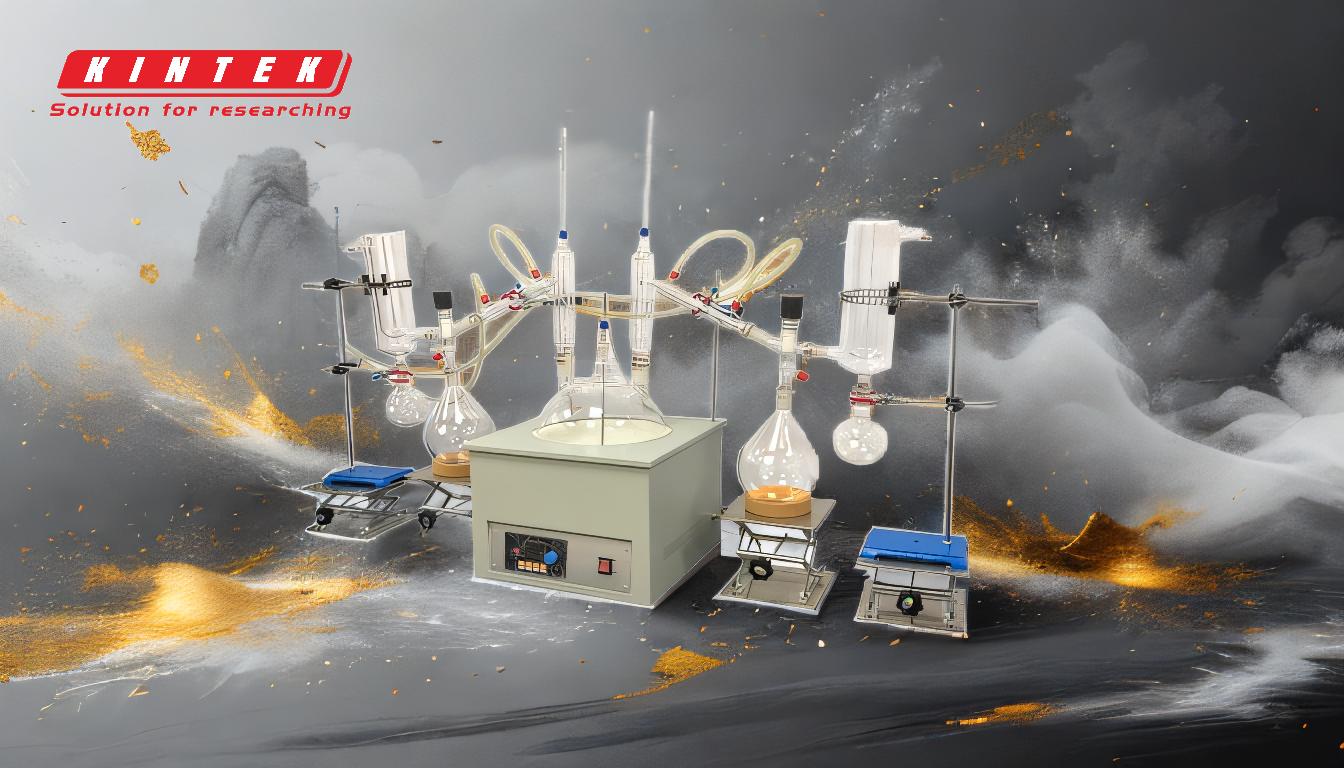Molecular distillation is a specialized separation technique that operates under high vacuum conditions to separate molecules based on their mean free path, making it ideal for thermally unstable compounds and substances with high boiling points. The process involves heating the mixture under extremely low pressure, causing the molecules to vaporize and travel a short distance before condensing on a cool surface. This method is particularly effective for purifying heat-sensitive compounds, such as vitamins and polyunsaturated fatty acids, and for separating complex mixtures with similar boiling points. Molecular distillation is widely used in industries like pharmaceuticals, food, and cosmetics for concentrating valuable compounds and removing impurities.
Key Points Explained:

-
Definition and Principle of Molecular Distillation:
- Molecular distillation is a separation technique that operates under high vacuum conditions, typically at pressures as low as 0.01 torr or below.
- The principle relies on the mean free path of molecules, which is the average distance a molecule travels before colliding with another. Under high vacuum, the mean free path increases, allowing molecules to travel freely without collisions.
- This process is particularly useful for separating thermally unstable compounds and substances with high boiling points, as it minimizes thermal degradation.
-
Process Mechanism:
- The mixture is heated under high vacuum, causing the molecules to vaporize. The vapor travels a short distance (typically around 2 cm) before condensing on a cool surface, such as a cold finger or condenser.
- The short distance minimizes surface hold-up and ensures immediate condensation, reducing the risk of degradation or loss of the desired compounds.
- The vacuum lowers the boiling points of the substances, reducing the energy required for heating and making the process more efficient.
-
Applications of Molecular Distillation:
- Purification of Heat-Sensitive Compounds: Molecular distillation is widely used to purify thermally sensitive compounds, such as vitamins, essential oils, and polyunsaturated fatty acids (e.g., omega-3 fatty acids).
- Separation of Complex Mixtures: It is effective for separating mixtures with similar boiling points or those that form azeotropes, which are difficult to separate using conventional distillation methods.
- Concentration of Valuable Compounds: The process is used to concentrate natural products, such as plant extracts, by removing unwanted impurities and solvents.
-
Advantages of Molecular Distillation:
- Low Thermal Degradation: The high vacuum and short exposure to heat minimize thermal degradation, making it suitable for heat-sensitive compounds.
- High Purity: The process yields high-purity products by effectively separating components based on their molecular properties.
- Energy Efficiency: The reduced boiling points under vacuum lower the energy requirements for heating, making the process more energy-efficient compared to traditional distillation.
-
Comparison with Traditional Distillation:
- Pressure Conditions: Molecular distillation operates under much lower pressures (0.01 torr or below) compared to traditional distillation, which typically operates at higher pressures.
- Temperature Sensitivity: Traditional distillation may not be suitable for heat-sensitive compounds due to the higher temperatures required, whereas molecular distillation is specifically designed for such applications.
- Separation Efficiency: Molecular distillation offers higher separation efficiency for compounds with similar boiling points or those that form azeotropes, which are challenging to separate using conventional methods.
-
Industrial Applications:
- Pharmaceutical Industry: Used for the purification of active pharmaceutical ingredients (APIs) and the concentration of natural extracts used in medicines.
- Food Industry: Applied in the production of edible oils, such as fish oil and vegetable oils, to remove impurities and concentrate beneficial components like omega-3 fatty acids.
- Cosmetics Industry: Utilized for the purification of essential oils and other natural ingredients used in skincare and beauty products.
-
Limitations and Challenges:
- High Equipment Cost: The specialized equipment required for molecular distillation, including high-vacuum systems, can be expensive.
- Complexity of Operation: The process requires precise control of vacuum levels and temperatures, making it more complex to operate compared to traditional distillation.
- Limited Scalability: While effective for small-scale purification, scaling up the process for large-scale production can be challenging and costly.
-
Future Prospects:
- Advancements in Technology: Ongoing research and development are focused on improving the efficiency and scalability of molecular distillation, making it more accessible for large-scale industrial applications.
- Expansion into New Industries: As the demand for high-purity, natural products grows, molecular distillation is expected to find new applications in industries such as nutraceuticals, biofuels, and advanced materials.
In summary, molecular distillation is a highly effective technique for separating and purifying thermally sensitive compounds and complex mixtures. Its ability to operate under high vacuum and low temperatures makes it indispensable in industries requiring high-purity products, such as pharmaceuticals, food, and cosmetics. Despite its challenges, advancements in technology are likely to expand its applications and improve its efficiency in the future.
Summary Table:
| Aspect | Details |
|---|---|
| Definition | Separation technique operating under high vacuum (≤ 0.01 torr). |
| Principle | Relies on mean free path of molecules for efficient separation. |
| Applications | Purification of vitamins, essential oils, and omega-3 fatty acids. |
| Advantages | Low thermal degradation, high purity, and energy efficiency. |
| Industries | Pharmaceuticals, food, and cosmetics. |
| Limitations | High equipment cost, operational complexity, and limited scalability. |
| Future Prospects | Improved efficiency, scalability, and expansion into new industries. |
Discover how molecular distillation can enhance your processes—contact our experts today for more information!










